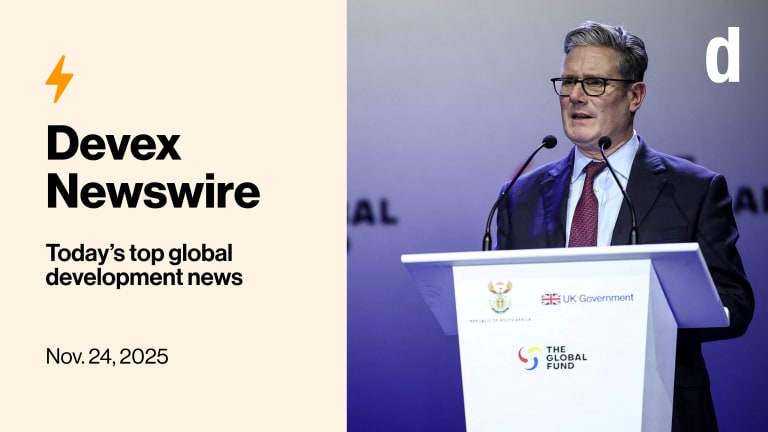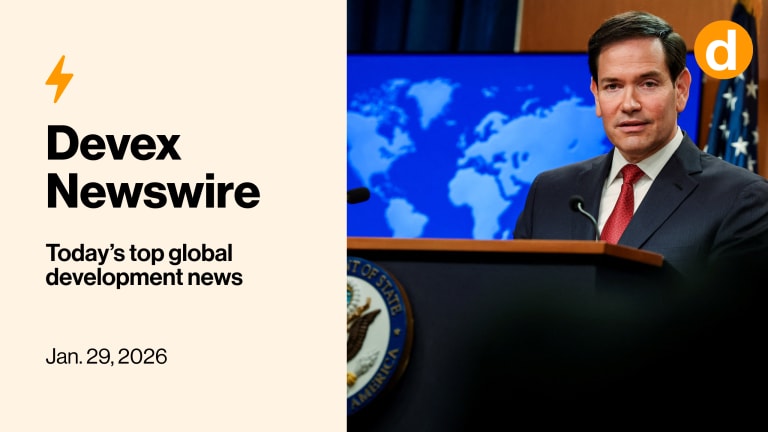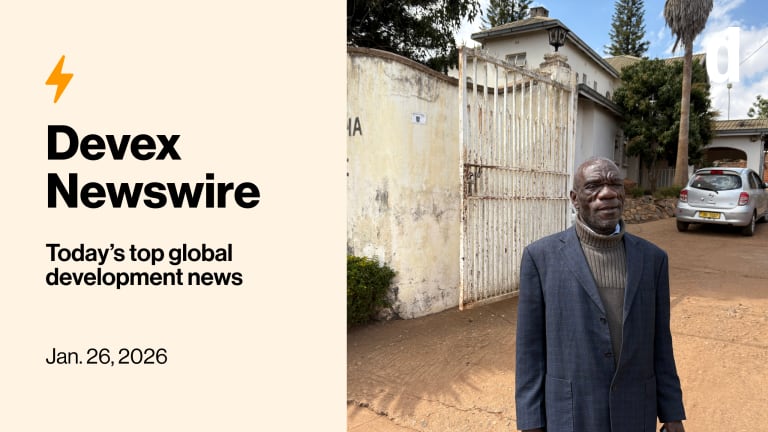
First the Paris Climate Agreement. Then the World Health Organization. Is the World Bank next on U.S. President Donald Trump’s hit list? Experts say it’s unlikely he’d withdraw the U.S. from the bank, but then again, Trump revels in the unlikely.
Also in today’s edition: We travel to the dark tunnel where one of the world’s deadliest viruses lurks.
+ Join us tomorrow, Feb. 19, at 10 a.m. ET for a post-Munich Security Conference briefing with Michael Werz, the North American representative for MSC, about the key takeaways and how shifting geopolitical tides are expected to affect development. Save your spot now.
Don’t bank on it
Trump does not do half-measures. He prefers bold action. Just ask USAID employees who have watched their agency disintegrate in the blink of an eye.
This is a preview of Newswire
Sign up to this newsletter for an inside look at the biggest stories in global development, in your inbox daily.
But would he be bold enough to dilute the U.S. share in the World Bank or ditch the bank altogether, considering how much power it wields — power he’d essentially be ceding to rivals such as China if he were to exit?
Many experts say it would be counterproductive to Trump’s “America First” stick-over-carrot approach, but it’s still within the realm of possibility. Project 2025, the conservative manifesto published by the Heritage Foundation, encourages the U.S. Treasury to “force reforms and new policies” in the World Bank and International Monetary Fund. It also recommends that the U.S. withdraw and “terminate its financial contribution.”
While Trump distanced himself from the blueprint on the campaign trail, he’s increasingly embraced it since then.
Logistically speaking, it would not be hard to pull out of the World Bank, my colleague Jesse Chase-Lubitz explains. Trump would pretty much just have to submit a notice to the bank. The big question mark is whether Congress has a say. Experts say such a withdrawal would be unprecedented, thus the legalities are largely up in the air.
“The term unprecedented is a good one,” says Clemence Landers of the Center for Global Development. “It’s so unclear the extent to which Congress needs to be involved in this or not. That’s the game-changing thing.”
Read: Could the US pull out of the World Bank? Unlikely — but not impossible
A private matter
Attracting private sector investment to secure lasting development has long been a goal of the aid sector. Now, in the face of Trump’s foreign funding freeze, it’s an absolute must.
Ironically though, as the president seeks to kneecap USAID, experts say the agency actually fosters private sector growth.
“Dismantling USAID is going to create significant funding gaps, and it's just going to make it harder for us to mobilize private capital and achieve impact at scale,” said Elizabeth Boggs Davidsen, the CEO of GSG Impact, during a recent Devex Pro event.
USAID, for example, has long played a key role in building local financial markets, supporting entrepreneurs, and de-risking investments.
“USAID often collaborates with development finance institutions like the World Bank, the IFC, the DFC, and regional banks, so the loss of its involvement could actually eliminate coordinated investment strategies in really important frontier markets,” Boggs Davidsen said.
As attention — and money — shifts from USAID, resources may gravitate toward development finance institutions, and the pressure to innovate will be on, said Samantha Attridge of ODI Global.
“I think the focus given the scarce kind of resource, and also tight fiscal budgets is this issue about efficient and effective use of capital of multilateral development banks and development finance institutions,” she said.
Watch the full event recording: As US aid falters, development finance trends to watch in 2025 (Pro)
+ To keep up to date with news about business, finance, and the SDGs, be sure to sign up to Devex Invested.
Pain points
In 2023, the United States spent $57.3 billion bilaterally on projects in low- and middle-income countries. So who’s going to bear the brunt of the U.S. foreign aid freeze?
If this funding were to cease, my colleague Alecsondra Kieren Si reports that the hardest-hit region would be Africa, which received $15.2 billion last year. Within Africa, the top recipients were Ethiopia, with $1.6 billion, followed by the Democratic Republic of Congo, with $1.2 billion.
Others would feel the pinch too. Check out our report for the rest.
Read: Which countries would be worst hit by the US aid freeze? (Pro)
+ Not yet a Devex Pro member? Start your 15-day free trial today to access all our expert analyses, insider insights, funding data, exclusive events, and more. Check out all the exclusive content and events available to you.
UNwelcome
It’s not just countries that will be hurt by the aid freeze — the United Nations could be left out in the cold as well.
A U.N. survey, seen by Devex, found that Trump’s stop-work order had already started to affect major U.N. agencies including the World Food Programme, UNICEF, and WHO.
The survey identified a wide range of potential impacts, from staffing to interruptions to critical programs. As of now, agencies are scrambling to mitigate the fallout — suspending projects, looking for other sources of funds for staff members, and tracking the financial implications.
My colleagues Colum Lynch and David Ainsworth break down the data to show which agencies are most affected — and what they expect the consequences to be.
Read: The US aid freeze in data — how will UN agencies be affected?
Leave the bats alone!
Carved into the side of a steep hill on the outskirts of Kigali is a cordoned-off tin mine tunnel with a red sign that reads: “Permanently closed.” Deep into that tunnel, there is a red door that reveals a cave punctuated by that eerie symphony of the rapidly fluttering wings of thousands of bats and their high-pitched chatter.
It was in this tunnel where a bat infected a miner with the Marburg virus, one of the deadliest pathogens to infect humans. The disease that ensues, which is similar to Ebola, can cause symptoms including bleeding from the nose, gums, and vagina, and a painful death.
Outbreaks can reach fatality rates of up to 88%, but in the recent three-month Marburg outbreak in Rwanda, the death rate was 22.7% — one of the lowest recorded rates in the history of viral hemorrhagic fevers.
My intrepid colleague Sara Jerving traveled to the exact spot where the outbreak began — Tunnel 12 — to learn more about how the outbreak started, how it was stopped, and the lessons it holds for the rest of the world as zoonotic diseases pose an increasing threat to humans.
“The most important to avoid spillover is to avoid that interface between human and bats,” says Dr. Edison Rwagasore of the Rwanda Biomedical Centre.
One of the more interesting lessons I learned from Sara’s story: Rwanda leaves the bats alone to live stress-free in their cave at the end of Tunnel 12. When they’re relaxed, they’re less prone to shedding the Marburg virus.
Read the on-the-ground report: Inside the infamous ‘Tunnel 12’ — the source of Rwanda’s Marburg outbreak
All in this together
Zoonotic diseases such as Marburg don’t recognize borders. That’s why critics of Trump’s aid freeze point out that exiting WHO — thereby curtailing global cooperation on deadly viruses — could come back to bite the U.S. if an infectious disease spreads to the country.
That argument has not, thus far, swayed the Trump administration — and like other organizations reliant on U.S. funding, WHO can’t wait around hoping for a change of heart from the White House.
So WHO Director-General Dr. Tedros Adhanom Ghebreyesus is contemplating the idea of a $50 billion endowment fund to help raise more sustainable funding, my colleague Jenny Lei Ravelo reports.
Tedros says such an endowment could generate between 3% to 5%, or about $1.5 billion to $2.5 billion annually for WHO, which struggled with its finances long before Trump’s withdrawal.
But now, the loss of the U.S. — the WHO’s biggest donor — is prompting some quick, creative thinking.
Still, Tedros stresses: “This is just an idea that hopefully will be realized, cautioning that “it's not going to be an easy task.”
Read: WHO chief eyes idea of a $50B endowment fund to plug resource gaps
In other news
Nigerian lawmakers approved $200 million in health funding to offset suspended U.S. aid, which had supported crucial programs such as malaria prevention and HIV treatment. [DW]
The latest U.N. report showed that the Asia-Pacific region is falling behind on most Sustainable Development Goals. [UN News]
Alessandra Morelli, a medic who aided Libya’s flood victims in 2023, will be among 14 medical responders receiving King Charles III’s new Humanitarian Medal. [BBC]
Sign up to Newswire for an inside look at the biggest stories in global development.








